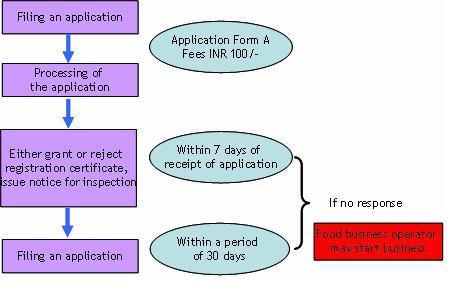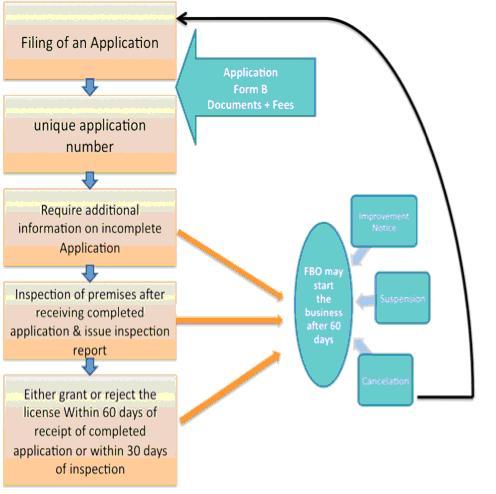|
|
|
You can get e-magazine links on WhatsApp. Click here
|
|
|
|
|
|
With Food Safety and Standards Act, India scales a new food safety era
|
|
Wednesday, 16 January, 2013, 08 : 00 AM [IST]
|
|
Ashok Jha
|
|
fiogf49gjkf0d  Basking in the glory of the food industry growth story, India can now also boast of having an integrated law to regulate food products across the country with the focus on curbing the menace of food adulteration and ensuring that consumers have access to safe food. Basking in the glory of the food industry growth story, India can now also boast of having an integrated law to regulate food products across the country with the focus on curbing the menace of food adulteration and ensuring that consumers have access to safe food.
Until recently, India had a complicated system to regulate food products with eight different acts and orders administered by four different ministries. We clearly lacked an integrated approach to food safety management with a holistic emphasis on risk mitigation, risk management and prosecution of willful perpetrators. So far, samples were collected at the point of occurrence and identification of contamination was generally carried out by inadequately trained staff, while subsequent testing of these samples was carried out in ill-equipped labs. These resulted in several legal disputes remaining unresolved on frivolous grounds of errors in sample collection and examination resulting in a lack of legally enforceable case against the offenders.
The presence of multiple acts and orders led to multiple controls over various commodities with conflicting provisions. The Government of India realised the need for harmonising the food laws as a pre-requisite for fostering growth in the food processing industry and successfully introduced the Integrated Food Safety Bill. In 2006, this Bill ultimately became the Food Safety and Standards Act (FSSA). Further, a statutory regulatory body, the Food Safety and Standards Authority of India (FSSAI), was constituted on September 5, 2008, under the ministry of health & family welfare. The FSSAI’s mandate is to lay down science-based standards for articles of food and to regulate their manufacture, storage, distribution, sale and import to ensure availability of safe and wholesome food for human consumption.
Salient Features of the Act
The Food Safety and Standards Act is a step in the right direction and seeks to modify the basic approach to food safety from farm to fork. Under the current Act, there is a clear shift from “checking adulteration and prosecution” to “self-compliance” enabling responsibility with the food business operator to comply with the law. The Act mandates , through a new set of regulations, untouched areas like proprietary foods, novel foods, GM foods, dietary supplements, nutraceuticals and more. The Act also stipulates bringing regulations / guidelines for food imports, food recall and an active surveillance system. The current Act also empowers consumers to draw samples and send these for analysis to recognised labs—an act of empowerment of consumer to prevent food contamination through a structured legal remedy. In case of minor offences, the Act stipulates faster disposal without going to courts. As per the new Act, the role of FSSAI will be
• To frame rules, regulations, standards and guidelines in relation to articles of food and provide guidelines for accreditation of certification bodies / laboratories
• To offer scientific advice and technical support to the Central and state governments in matters of framing the policy and rules in areas related to food safety and nutrition
• To collect and collate data on food consumption, incidence and prevalence of biological risk, contaminants or residues thereof in food, and the introduction of a rapid alert system
• To establish an information dissemination network about food safety across the country
• To contribute to the development of international technical standards for food safety and phyto-sanitary standards
• To promote general awareness on food safety and food standards
Status of Implementation of Act, Rules and Regulations
The Food Safety and Standards Act is further strengthened with a new set of detailed rules and regulations coming into force in the year 2011. Food Safety and Standards Rules which came into effect in Feb 2011, details the administrative and enforcement structure, processes and procedures for sampling, prosecution & appeal, and powers and duties of various functionaries under the Act. Further, the Authority notified Food Safety and Standards Regulations into 6 parts on August 5, 2011:
• Food Safety and Standards (Licensing and Registration of Food Businesses) Regulations, 2011
• Food Safety and Standards (Packaging and Labelling) Regulations, 2011
• Food Safety and Standards (Food Products Standards and Food Additive) Regulations, 2011
• Food Safety and Standards (Contaminants, Toxins and Residues) Regulations, 2011
• Food Safety and Standards (Prohibition and Restrictions on Sales) Regulations, 2011
• Food Safety and Standards (Laboratory and Sample Analysis) Regulations, 2011
The Act, read together with these regulations, amalgamates all the previous laws and orders with duplications, conflicts, and redundancies removed, and covers in a more structured manner, the licensing of food businesses, standards for additives and food products, limits for contaminants, residues, labelling guidelines, prohibitory aspects of sale of food products, proprietary food and more. The FSSAI envisages the necessity of upgrading existing labs and creating a large network of new labs in order to provide the requisite support to the new and vibrant food safety regime.
The Authority has also taken steps to create a new enforcement structure and judicial dispensation system for fast track disposal of cases. The state level food safety commissioners will play a key role in surveillance and enforcement. Food safety commissioners in every state with the designated officers are now responsible for enforcing the act in every district. The Authority has constituted scientific panels and scientific committees to address all scientific matters relating to food safety so that matters of emerging science can be discussed and factored in during the development of new products by the industry. Sathguru Management Consultants played an important role in supporting the efforts of the Authority over the two years in the formation of the needed structures at the apex and grassroot levels.
Licensing and Registration of Food Businesses
Licensing and registration of food businesses are governed by Food Safety and Standards (Licensing and Registration of Food Businesses) Regulations, 2011, which came into force on August 5, 2011. The regulations detail the procedure for registering food businesses to cover all petty food businesses. Petty food business operators means any food business operator, who
• Manufactures food himself or sells any article of food or a petty retailer, hawker, itinerant vendor or temporary stall holder; or
• Such other industries relating to food business with an annual turnover not exceeding Rs 1.2 million and whose
? Production capacity of food (other than milk and milk products and meat and meat products) does not exceed 100 kilo/litre per day, or
? Production or procurement or collection of milk is up to 100 litre of milk per day, or
? Slaughtering capacity is 2 large animals or 10 small animals or 50 poultry birds per day or less
The regulations stipulate a simplified procedure for obtaining a registration certificate as depicted below:

For obtaining a licence, all FBOs should make an application to the State or Central Licensing Authority based on the cut-off set under Schedule I. All new FBOs should make a fresh application as per the requirement of these regulations. Existing licensees were supposed to get their existing licenses converted into new ones under these regulations within one year of its notification, which is now further extended by six months. Currently, Central licences are being granted online through the link http://foodlicensing.fssai.gov.in/UserLogin/Login.aspx. Central licences are currently granted by designated officers (DOs) appointed for this purpose for seven zones. Application for state licences must be made to DOs of the respective districts appointed by the food safety commissioner of the respective states in the prescribed proforma. The regulations stipulate the procedure for obtaining a licence as depicted below:

Product Approval: All FBOs manufacturing any article of food that does not fall under any of the food categories prescribed under these regulations or deviates in any way from the prescribed specification for additives therein, these operators would first apply for a product / ingredient approval in the prescribed proforma before using the same in their operations. Based on the nature of the product / ingredient and the associated risk involved, the approval would be granted or rejected via an approval process presided over by an approval committee headed by the chief, product approvals, FSSAI.
Key Deficiency areas to be Addressed: The nationwide surveillance to identify food-borne pathogens, recurrence of pathogens and the impact of such pathogens on human health requires a nationwide structured effort to collect and enumerate the data on a yearly basis. This will provide the general public with an awareness of the key food pathogens that cause illness and the manner in which such illnesses can be prevented by food service ventures and the consumers adopting safe practices.
The Center for Disease Control (CDC) in Atlanta, GA, annually publishes the needed data for the United States. There are other OECD countries which publish this useful data every year. India needs a robust system of surveillance for the length and breadth of our country and it is a challenge to carry out this surveillance in a cost-effective manner. The role of academic institutions in conducting such surveillance will be a great complement to the efforts of the food safety authority. The surveillance also requires inter-disciplinary talent with qualified food safety specialists, computing specialists, statisticians and sociologists engaging in this process. These are priorities to address in making India a safe food destination.
(The writer is GM, life science advisory group, Sathguru Management Consultants. He has led the efforts at Sathguru in providing advisory service to FSSAI for over two years in shaping the whole initiative, duly assisting in drafting of rules and regulations, and advising on existing and emerging areas in food regulations)
|
|
|
|
|
|
|
|
|
|